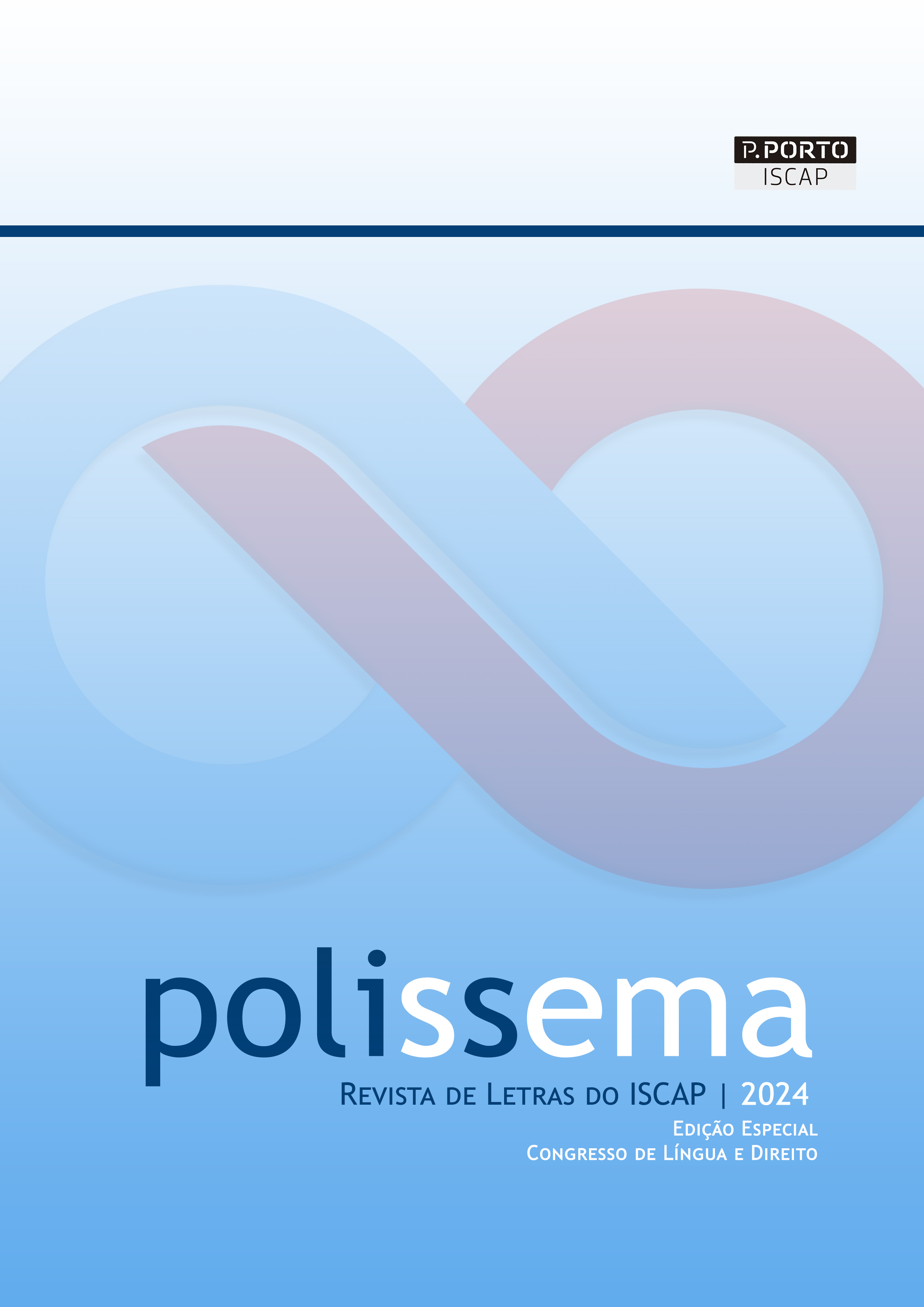(NON-)COMPLIANCE WITH THE LAW OF ADMINISTRATIVE MODERNIZATION. CONSIDERATIONS ABOUT POSSIBLE CAUSES AND INEVITABLE CONSEQUENCES
DOI:
https://doi.org/10.34630/polissema.vi.5659Keywords:
administrative modernization, legal language, plain language, Decree-Law n.º 135/99Abstract
Portuguese legislation has provided for the protection of issues related to the state's communication with citizens since 1966 (Article 6 of the Civil Code) and 1989 (Article 20 of the Constitution of the Portuguese Republic). In 1999, Article 16 of the Administrative Modernisation Law provided more specific support for this issue (as did Article 2(g), added in 2014).
Although previous provisions had already demonstrated the legislator's concern with the issue of legal language, it is with the Administrative Modernisation Law that we first have a legal provision specifically addressing it. The aforementioned articles of this law clearly define that the Public Administration must address citizens using "simple, clear, concise and meaningful language, without acronyms, technical terms or reverential or intimidating expressions".
More than twenty years on from the publication of this law, we need to take stock of how our legal system is complying with its provisions, and it is true that the general public's perception continues to be that the language of the Portuguese administration is complex and bureaucratic.
In order to reflect on the possible causes of this non-compliance with the legal provisions, it is imperative to resort to the knowledge of Language Sciences, to study the linguistic variant that legal discourse embodies and its consequences in the act of communication. We will then discuss a real case that triggered administrative changes that have already had positive consequences. Finally, we will try to put forward some solutions.
References
Carmo, R. (2012). A exigência e relevância democráticas da compreensibilidade do discurso judiciário. Linguagem, Argumentação e Decisão Judiciária. Coimbra Editora, pp. 65-73.
Carvalho, J. H. (1984). Teoria da Linguagem: natureza do fenómeno linguístico e a análise das línguas. Coimbra Editora (4ª Reimpressão).
Cordeiro, A. M. (2020). Código Civil Comentado. Vol. I-Parte Geral. Almedina.
DGPJ - Direção-Geral da Política de Justiça do Ministério da Justiça (2023, 23 de out.). Simplificação da linguagem nas injunções com resultados positivos. https://rb.gy/6tpnr8.
Fernandez, E. (2016). O não estranho caso de Verónica C. (a comunicação dos tribunais e a iliteracia jurídica). Revista Julgar, 1(30).
Gabinete da Secretária de Estado Adjunta e da Justiça (2018). Intervenção da Secretária de Estado Adjunta e da Justiça na conferência “A linguagem dos tribunais e os seus destinatários – necessidade de simplificação”. Escola de Direito da Universidade do Minho, 28 de setembro de 2018. República Portuguesa. https://rb.gy/4une84.
Garmadi, J. (1983). Introdução à Sociolínguística. Publicações Dom Quixote.
HiperFM (2023, 11 de jan.). “Pipoca Mais Doce” queixa-se de “impostos a mais”, recebe “crítica” e dá resposta: “A culpa é do contribuinte…”. https://shorturl.at/dovDS.
Lusa (2023, 14 de junho). Governo está a preparar uma nova lei da modernização administrativa. https://t.ly/0HsgH.
Maingueneau, D. (1997). Introdução à Linguística. Gradiva.
Rodrigues, M. C. C. (2007). Linguagem, discurso e direito: algumas questões de linguística jurídica. Revista Do Ministério Público, 111(julho-setembro 2007), pp. 5-37.
Teixeira, J. (2014). Como Funcionam as Línguas? Uma Introdução às Ciências da Linguagem. Edições Húmus.
Tiersma, P.M. (1999). Legal Language. The University of Chicago Press.
TSF (2021, 31 de março). Simplificação de cartas do tribunal aumentou em 67% pagamento voluntário de dívidas. https://t.ly/htboC.
Downloads
Published
How to Cite
Issue
Section
License
Copyright (c) 2024 POLISSEMA – ISCAP Journal of Letters

This work is licensed under a Creative Commons Attribution-NonCommercial-NoDerivatives 4.0 International License.


